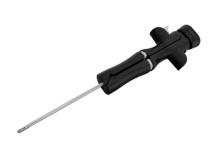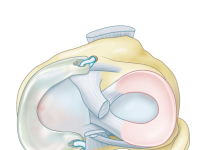InnovHeart (Newton, Massachusetts and Milan) announced the first trans-septal clinical trial implant of its proprietary Saturn transcatheter mitral valve. According to the company, there were excellent hemodynamic results for the patient — a 79-year-old woman suffering from severe mixed (degenerative and functional) mitral regurgitation. The procedure was part of system’s ongoing European clinical trial, the CASSINI-EU study. It took place on May 8 at at Santaros Klinikos University Hospital in Vilnius, Lithuania, with the heart team of Drs. Kęstutis Ručinskas, Giedrius Davidavičius, Agnė Drąsutienė, and Vilhelmas Bajoras, MD1, supported by Drs. Torsten Vahl, Lauren Ranard, Paolo Denti, and Stefano Stella.
Related: FIRE1 implants first patient with vessel sensor in Ireland
“We were honored to work with this outstanding international team providing life-changing novel TMVR therapy for this high surgical-risk patient. It is particularly rewarding to support the InnovHeart progression from trans-apical to trans-septal delivery of the Saturn Valve at our Institute,” Davidavičius said in a May 30 news release.
Vahl said the first procedure was a critical step to validate that it’s possible to successfully deliver the Saturn valve via a fully percutaneous, transfemoral transseptal approach. “The Saturn prosthesis has a unique modular design comprising an annular ring and low-profile valve that can reverse remodel the native annulus, avoid LVOT obstruction and eliminate MR.”
Denti, the principal investigator for the CASSINI-EU study, said the case demonstrates that the Saturn valve can be successfully implanted with either retrograde (against blood flow) or antegrade (with blood flow) approaches.
“It is exciting to add trans-septal delivery and begin to expand the clinical experience for the Saturn valve beyond the initial trans-apical study, now in long-term follow-up. I continue to believe that Saturn will become a valuable new therapy with fewer anatomical exclusions than other technologies, with the potential to treat a wider range of patients,” Denti said.




